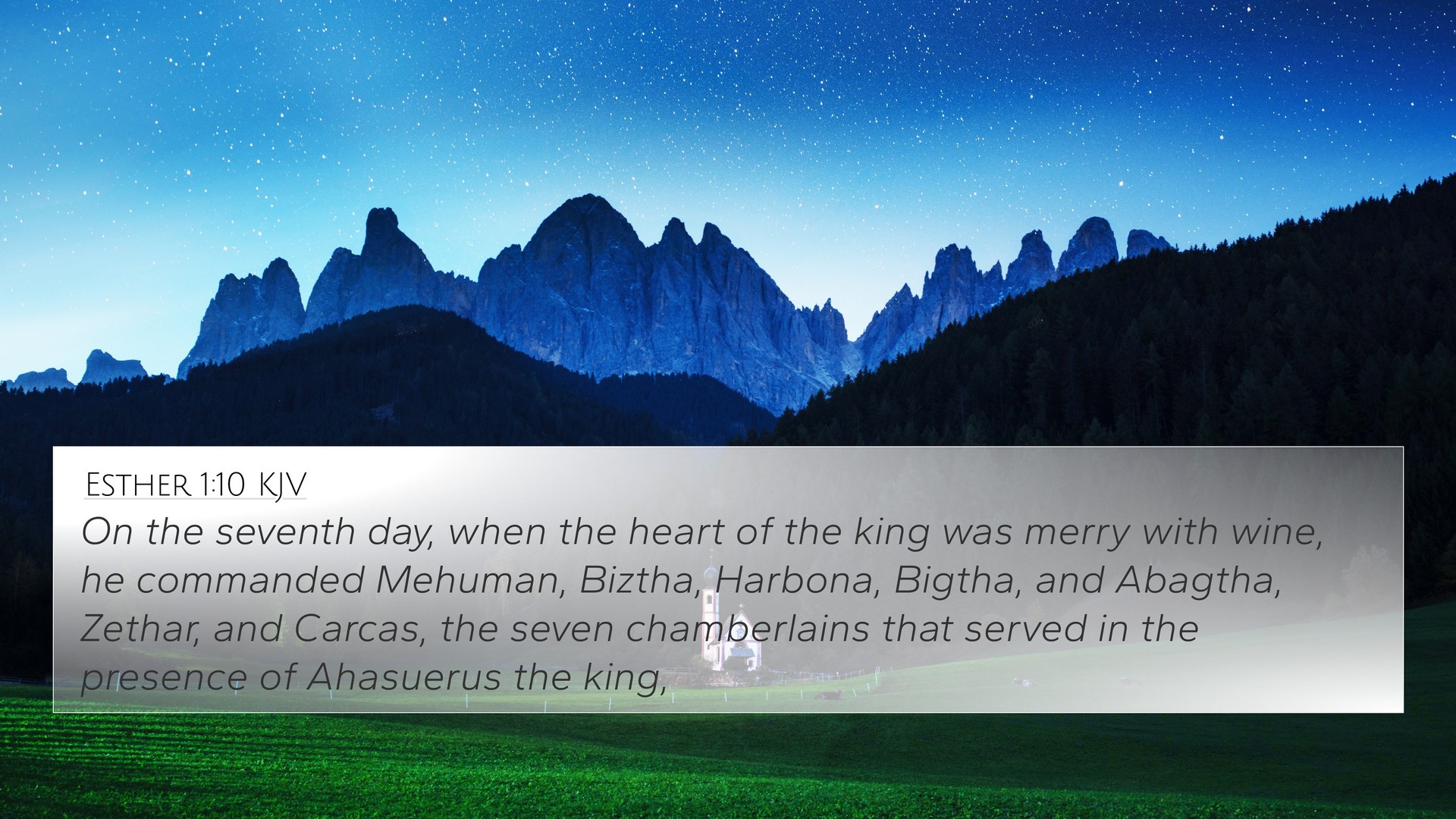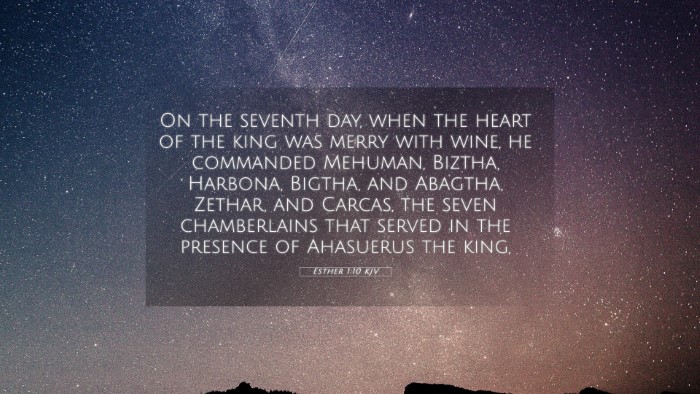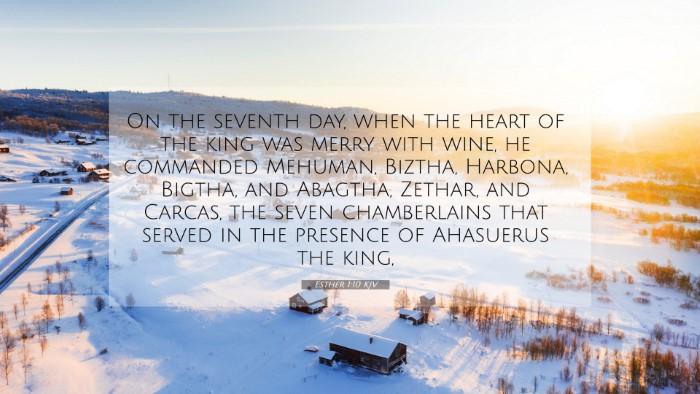Old Testament
Genesis Exodus Leviticus Numbers Deuteronomy Joshua Judges Ruth 1 Samuel 2 Samuel 1 Kings 2 Kings 1 Chronicles 2 Chronicles Ezra Nehemiah Esther Job Psalms Proverbs Ecclesiastes Song of Solomon Isaiah Jeremiah Lamentations Ezekiel Daniel Hosea Joel Amos Obadiah Jonah Micah Nahum Habakkuk Zephaniah Haggai Zechariah MalachiEsther 1:10 Similar Verses
Esther 1:10 Cross References
On the seventh day, when the heart of the king was merry with wine, he commanded Mehuman, Biztha, Harbona, Bigtha, and Abagtha, Zethar, and Carcas, the seven chamberlains that served in the presence of Ahasuerus the king,
Uncover the Rich Themes and Topics of This Bible Verse
Listed below are the Bible themes associated with Esther 1:10. We invite you to explore each theme to gain deeper insights into the Scriptures.
Esther 1:10 Cross Reference Verses
This section features a detailed cross-reference designed to enrich your understanding of the Scriptures. Below, you will find carefully selected verses that echo the themes and teachings related to Esther 1:10 KJV. Click on any image to explore detailed analyses of related Bible verses and uncover deeper theological insights.
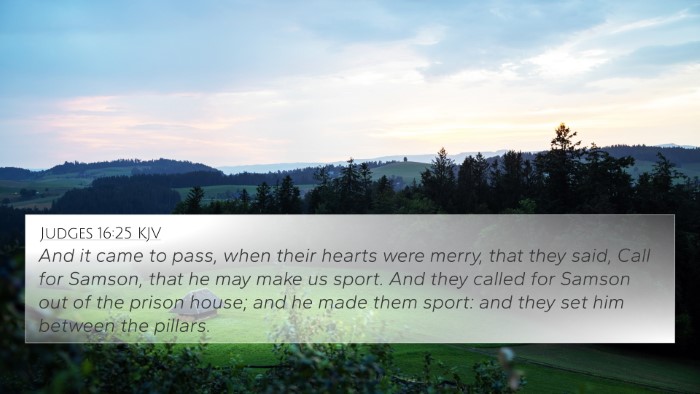
Judges 16:25 (KJV) »
And it came to pass, when their hearts were merry, that they said, Call for Samson, that he may make us sport. And they called for Samson out of the prison house; and he made them sport: and they set him between the pillars.
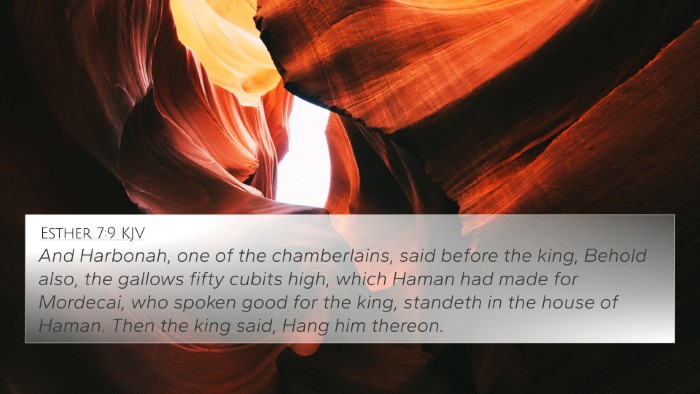
Esther 7:9 (KJV) »
And Harbonah, one of the chamberlains, said before the king, Behold also, the gallows fifty cubits high, which Haman had made for Mordecai, who spoken good for the king, standeth in the house of Haman. Then the king said, Hang him thereon.
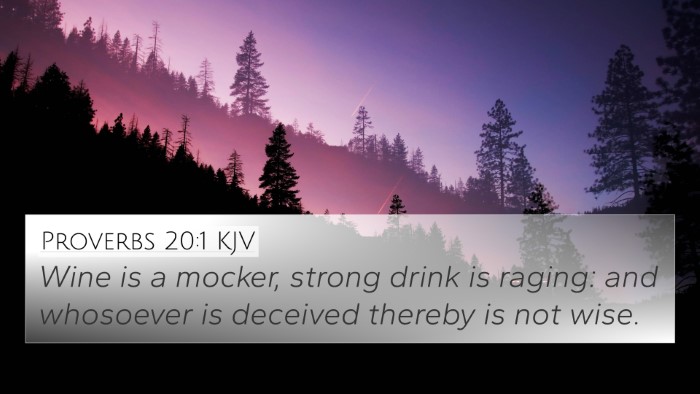
Proverbs 20:1 (KJV) »
Wine is a mocker, strong drink is raging: and whosoever is deceived thereby is not wise.
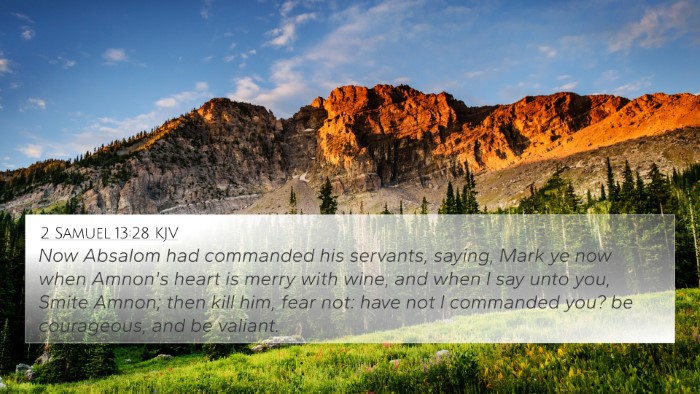
2 Samuel 13:28 (KJV) »
Now Absalom had commanded his servants, saying, Mark ye now when Amnon's heart is merry with wine, and when I say unto you, Smite Amnon; then kill him, fear not: have not I commanded you? be courageous, and be valiant.
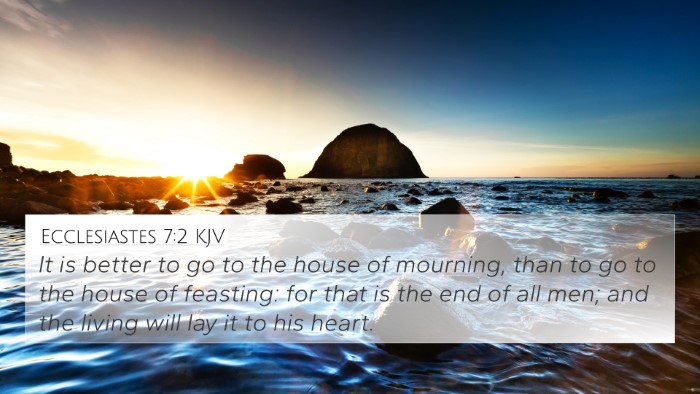
Ecclesiastes 7:2 (KJV) »
It is better to go to the house of mourning, than to go to the house of feasting: for that is the end of all men; and the living will lay it to his heart.
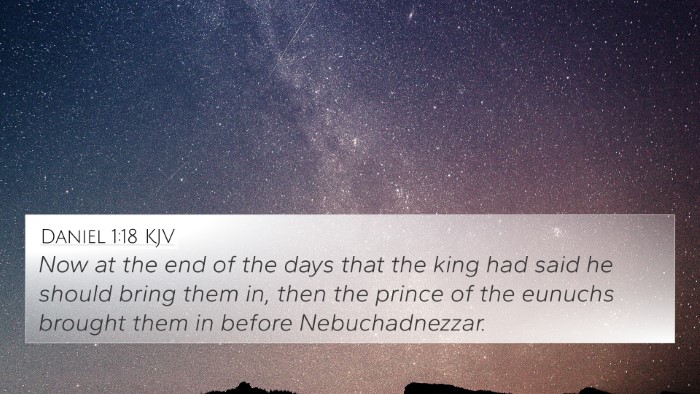
Daniel 1:18 (KJV) »
Now at the end of the days that the king had said he should bring them in, then the prince of the eunuchs brought them in before Nebuchadnezzar.

Daniel 1:3 (KJV) »
And the king spake unto Ashpenaz the master of his eunuchs, that he should bring certain of the children of Israel, and of the king's seed, and of the princes;

Ecclesiastes 10:19 (KJV) »
A feast is made for laughter, and wine maketh merry: but money answereth all things.
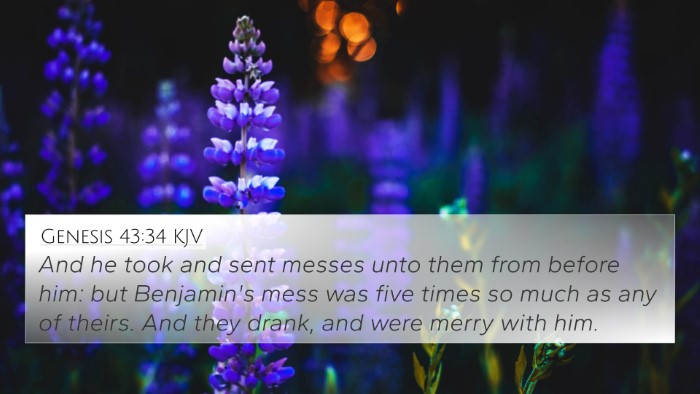
Genesis 43:34 (KJV) »
And he took and sent messes unto them from before him: but Benjamin's mess was five times so much as any of theirs. And they drank, and were merry with him.

1 Samuel 25:36 (KJV) »
And Abigail came to Nabal; and, behold, he held a feast in his house, like the feast of a king; and Nabal's heart was merry within him, for he was very drunken: wherefore she told him nothing, less or more, until the morning light.
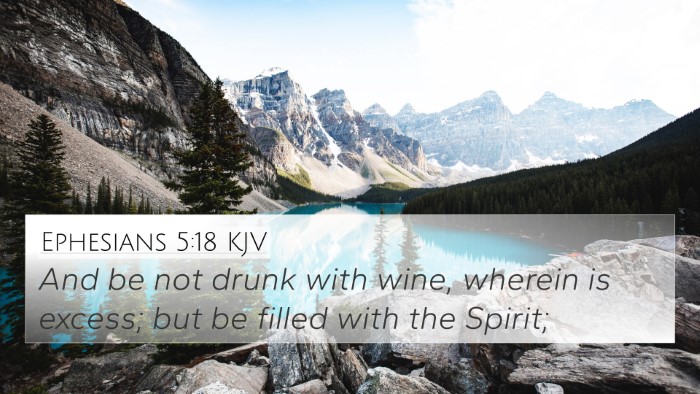
Ephesians 5:18 (KJV) »
And be not drunk with wine, wherein is excess; but be filled with the Spirit;
Esther 1:10 Verse Analysis and Similar Verses
Understanding Esther 1:10
Esther 1:10 narrates a pivotal moment in the story of Queen Esther, where King Ahasuerus, influenced by wine and the atmosphere of his opulent banquets, commands the presence of Queen Vashti, resulting in a significant twist that sets the stage for future events in the book.
Verse Text
“On the seventh day, when the heart of the king was merry with wine, he commanded Mehuman, Biztha, Harbona, Bigtha, Abagtha, Zethar, and Carcas, the seven eunuchs who served in the presence of Ahasuerus the king,” (Esther 1:10, ESV)
Commentary Overview
This verse highlights the extravagant lifestyle of the Persian Empire, as well as the king's capricious nature, which is often influenced by drink. The commentaries by Matthew Henry, Albert Barnes, and Adam Clarke offer substantial insights into the underlying significance of the text.
Matthew Henry's Commentary
Matthew Henry emphasizes the indulgence of the king and the folly of excessive drinking. He notes that such excess often leads to irrational decisions that can have far-reaching consequences. Furthermore, Henry discusses the societal dynamics at play, pointing out how the king's decisions affect not only himself but also his realm. The author observes the importance of honor and dignity in court proceedings and how the king's call for Vashti reflects his disregard for her autonomy.
Albert Barnes' Notes
Albert Barnes provides a detailed look at the internal and external conflicts within the Persian court. He explores the implications of the king's request to Vashti, noting that it serves as a crucial turning point. Barnes makes connections to how the king's pride and public persona are at odds with his private desires, and he discusses the importance of women in the narrative. He suggests that Vashti's refusal is emblematic of her strength, and the subsequent fallout leads to Esther's rise.
Adam Clarke's Commentary
Adam Clarke delves into the cultural norms of the time, highlighting the power dynamics between men and women. He notes that the king's behavior is reflective of the patriarchal society in which they lived. Clarke also discusses how this incident illustrates the folly of seeking validation through displays of power and drunken revelry. He relates this moment to the overarching theme of divine providence, indicating that God uses these events to orchestrate His plan for the Jewish people.
Key Themes and Insights
- Alcohol and Decision-making: The influence of intoxication on the king's judgment raises questions about the wisdom of leaders who govern under the effect of substances.
- Gender Dynamics: Vashti's refusal to appear at the king's request highlights the changing role of women and sets the stage for Esther's narrative.
- Divine Providence: The unfolding drama illustrates God's unseen hand guiding the events for a greater purpose.
- Cultural Norms: The commentary discusses the societal norms of ancient Persia regarding kingship and gender roles.
- Consequences of Pride: The king's actions are rooted in a desire to display power and status, leading to significant repercussions.
Bible Cross-References
Esther 1:10 connects with several other scripture passages that enhance its understanding. Here are key cross-references:
- Proverbs 20:1: “Wine is a mocker, strong drink is raging: and whosoever is deceived thereby is not wise.” - This verse underlines the dangers of excessive drinking.
- 1 Peter 3:7: “Likewise, ye husbands, dwell with them according to knowledge, giving honour unto the wife, as unto the weaker vessel...” - This connects to the theme of respect within marriage.
- Ephesians 5:18: “And be not drunk with wine, wherein is excess; but be filled with the Spirit.” - A counterpoint to the king's drunkenness.
- Proverbs 31:4-5: “It is not for kings, O Lemuel, it is not for kings to drink wine; nor for princes strong drink...” - Directly addresses kings' responsibilities regarding alcohol.
- Esther 2:17: “And the king loved Esther above all the women, and she obtained grace and favour in his sight...” - The beginning of Esther's influence and significance after Vashti's refusal.
- Luke 16:15: “...for that which is highly esteemed among men is abomination in the sight of God.” - A reminder that worldly values often conflict with God's will.
- Isaiah 3:12: “As for my people, children are their oppressors, and women rule over them...” - Discusses shifting power dynamics relevant to the context of Esther.
Thematic Connections
This verse opens a dialogue between various themes within the Bible, highlighting:
- The Perils of Alcohol: Seen across scriptures, emphasizing the need for wisdom in leadership.
- Women in Leadership: Examines the role and agency of women in both the Old and New Testaments.
- God's Sovereignty: Throughout the Bible, God works through flawed individuals to achieve His divine purposes.
- Public vs. Private Persona: A recurring theme as seen in the lives of biblical characters.
Practical Applications
Readers can contemplate the implications of Esther 1:10 in their lives:
- Reflection on Influence: Consider how external influences, like alcohol, affect decision-making.
- Honoring Relationships: Evaluate how one respects and honors roles within relationships, inspired by Vashti's stand.
- Understanding God's Plan: Identify how personal trials fit into God's broader narrative for one's life and community.
Conclusion
Esther 1:10 serves as a critical text for understanding the narrative of Queen Esther and the complexities surrounding power, gender, and divine intervention. The lessons drawn from this verse resonate profoundly in the context of leadership, relationships, and the acknowledgment of God’s sovereign hand in human affairs.
